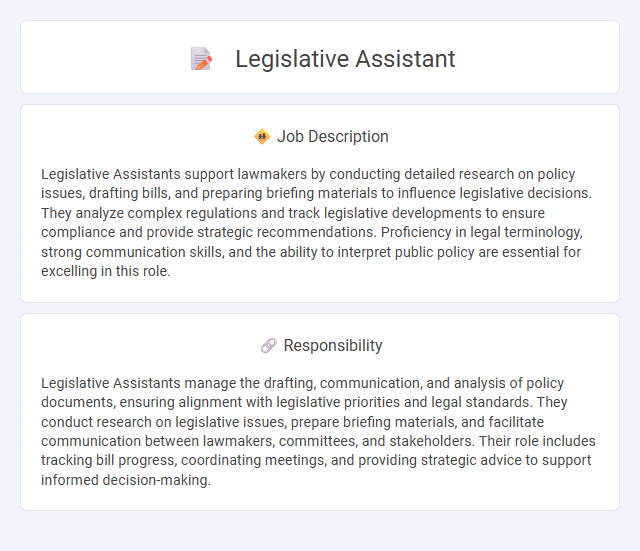
Legislative Assistants support lawmakers by conducting detailed research on policy issues, drafting bills, and preparing briefing materials to influence legislative decisions. They analyze complex regulations and track legislative developments to ensure compliance and provide strategic recommendations. Proficiency in legal terminology, strong communication skills, and the ability to interpret public policy are essential for excelling in this role.
People with strong organizational skills and an interest in politics may be well-suited for a Legislative Assistant role. Those who thrive under pressure and can manage multiple tasks simultaneously probably find this job fitting their capabilities. Individuals lacking attention to detail or a passion for legislative processes might face challenges in fulfilling the demands of this position.
Qualification
A Legislative Assistant typically requires a bachelor's degree in political science, public administration, or a related field, combined with strong research and analytical skills. Proficiency in legislative processes, excellent communication abilities, and experience with policy analysis or drafting are critical qualifications. Familiarity with government regulations, attention to detail, and the ability to manage multiple priorities enhance effectiveness in supporting legislators.
Responsibility
Legislative Assistants manage the drafting, communication, and analysis of policy documents, ensuring alignment with legislative priorities and legal standards. They conduct research on legislative issues, prepare briefing materials, and facilitate communication between lawmakers, committees, and stakeholders. Their role includes tracking bill progress, coordinating meetings, and providing strategic advice to support informed decision-making.
Benefit
A Legislative Assistant position likely offers benefits such as gaining in-depth knowledge of governmental processes and policy development, enhancing analytical and communication skills through drafting legislation and liaising with stakeholders. There is also a strong probability of career advancement opportunities within political or public service sectors due to close working relationships with lawmakers. Access to a professional network and insights into legislative strategy may further contribute to long-term career growth.
Challenge
A Legislative Assistant job likely involves navigating complex policy issues and managing multiple stakeholders' interests, presenting ongoing challenges in balancing diverse viewpoints. The role probably demands strong analytical skills to interpret legislation and anticipate potential impacts. Adapting to fast-paced legislative environments may require continuous learning and quick decision-making under pressure.
Career Advancement
Legislative Assistants play a crucial role in supporting lawmakers by researching policies, drafting legislation, and managing communications, which builds a strong foundation for career progression within government or public policy sectors. Mastery of policy analysis, constituent relations, and legislative procedures enhances opportunities for advancement to senior advisory roles, committee management, or elected office. Networking with political stakeholders and continuous skill development in public affairs further accelerates career growth in legislative environments.
 kuljobs.com
kuljobs.com